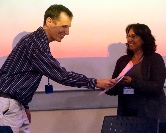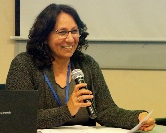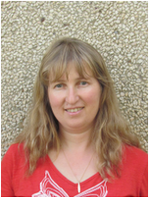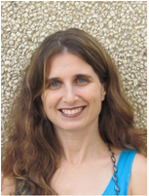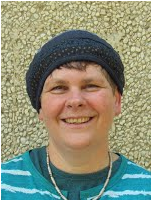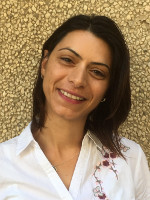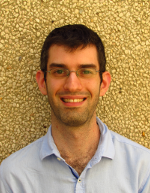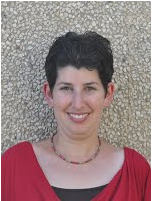
Yaela Golumbic, Ph.D. Student
Yaela started her professional career as a scientist, working in the lab and developing novel molecular biology methodologies. She obtained her B.A. in Plant Science from the Hebrew University’s Faculty of Agriculture in Rehovot, and her M.A. in Molecular Biology from the Technion – Israel Institute of Technology.
The gap between research topics and public agenda, and lack of public awareness to the importance of scientific research, dialog and engagement, brought Yaela to fields of science communication and public participation in scientific research.
Yaela’s PhD thesis, under the joint academic supervision of Prof. Ayelet Baram-Tsabari from the Faculty of Education in Science and Technology and Prof. Barak Fishbain from the Faculty of Civil and Environmental Engineering, focused on the exciting field of citizen science and its ability to engage the public in scientific investigation. Building on science communication models, Yaela designed and led the citizen science initiative “Sensing the Air” for engaging citizens in meaningful air quality research.
After completing her PhD studies, Yaela developed and led the “Radon home survey” for self-monitoring of radon levels in private spaces and involving school students in authentic scientific inquiry, as part of her involvement in the Taking Citizen Science to Schools (TCSS) research excellence center.
Yaela has recently relocated to Australia and is currently a postdoctoral fellow at the University of Sydney. Yaela is leading the research on student and public participation in Breaking Good – a citizen science initiative that empowers members of the public to be active researchers in projects that improve human health. Her research examines ways to engage diverse audiences in science, making science accessible and relevant to peoples’ day-to-day lives, and creating a dialogue between scientists, publics, student and decision makers.
Publications
Peer reviewed papers
Golumbic, Y.N., Fishbain B. & Baram-Tsabari, A. (2020) Science literacy in action: Understanding scientific data presented in a citizen science platform by non-expert adults. International Journal of Science Education, Part B.
Tsapalov, A., Kovler, K., Shpak, M., Shafir, E., Golumbic, Y., Peri, A., Ben-Zvi, D., Baram-Tsabari, A., Maslova, T. and Schrired, O. (2020) A radon survey in Israel involving school children by means of the “RadonTest” online system. Journal of Environmental Radioactivity, 217 (106215).
Golumbic, Y.N., Koichu, B. & Baram-Tsabari, A. (2019). Engagement and communication features of scientifically successful citizen science projects. Environmental communication. Environmental Communication, 1-19.
Golumbic, Y.N., Fishbain B. & Baram-Tsabari, A. (2019). User centered design of a citizen science air-quality monitoring project. International Journal of Science Education, Part B 9(3), 195-213.
Zaidan, H., Ramaswami, G., Golumbic, Y.N., Sher, N., Malik, A., Barak, M., Galiani, D., Dekel, N., Li, J.B & Gaisler-Salomon, I. (2018). A-to-I RNA editing in the rat brain is age-dependent, region-specific and sensitive to environmental stress across generations. BMC genomics, 19(1), 28.
Golumbic, Y.N., Orr, D., Baram-Tsabari, A., and Fishbein, B. (2017). Between vision and reality: A Case Study of Scientists’ Views on Citizen Science. Citizen science theory and practice 2(1), 1-13.
Fishbain, B., Lerner, U., Cole-Hunter, T., […] Golumbic, Y., Baram-Tsabari, A., Robinson, J., Kocman, D., Horvat, M.; Svecova, V., Arpaci, A. & Bartonova, A. (2016). An Evaluation Tool Kit of Air Quality Micro-Sensing Units. Science of the Total Environment, 575, 639-648.
Golumbic, Y.N., Baram-Tsabari, A., & Fishbain B. (2016). Increased knowledge and scientific thinking following participation of school students in air-quality research. Proceedings of the 14th international conference of indoor air quality & climate. Ghent, Belgium (July 3-8).
Golumbic, Y.N, Baram-Tsabari, A., & Fishbain B. (2015). Citizen science: Public participation in science [in Hebrew]. Ecology and the Environment, 6(1), 14-23.
Brande-Eilat, N., Golumbic, Y.N., Zaidan H. & Gaisler-Salomon, I. (2015) Acquisition of conditioned fear is followed by region-specific changes in RNA editing of glutamate receptors. Stress, 18(3), 309-318.
Gaisler-Salomon, I., Wang, Y., Chuhma, N., Zhang, H., Golumbic, Y.N., Mihali, A., Arancio, O., Sibille, E. & Rayport S. (2012). Synaptic underpinnings of altered hippocampal function in glutaminase-deficient mice during maturation. Hippocampus 22 (5) 1027-39.
Submitted papers
Roche, J., Bell, L., Galvão C., Golumbic, Y.N., Kloetzer, L., Knoben N., Laakso, M., Lorke, J., Mannion, G., Massetti, L., Mauchline, A., Pata, K., Ruck, A., Taraba, P., & Winter S. (Submitted). Citizen Science, Education, and Learning: Challenges and Opportunities. Cultural Studies of Science Education
Gunnell, J.L., Golumbic, Y.N., Hayes, T., Cooper M. (Submitted). Putting co-created citizen science into practice. Journal of Science Communication.
Golumbic, Y.N., Dalyot, K. & Barel, Y. (Submitted). Using Day-to-Day Scenarios to Learn How Non-scientists Reason with Science. Public Understanding of Science
Golumbic, Y.N., Fishbain B. & Baram-Tsabari, A. (Submitted). Engagement styles in an environmental citizen science project: a multiple case study. Journal of Science Communication.
Book chapters
Kloetzer, L., Lorke, J., Joseph Roche, Golumbic, Y.N., Winter, S. & Jõgeva, A. (in press). Learning in Citizen Science. In: The Science of Citizen Science. Editors: Vohland, K., Land, A., Ceccaroni, L., Perello, J., Ponti, M., Samson, R., Wagenknecht, K., & Lemmens, R.
Baram-Tsabari, A., Orr, D., Baer, A., Garty, E., Golumbic, Y.N., Halevy, M., Krein, E., Levi, A., Leviatan, N., Lipman, N., Mir, R. & Nevo, E. (2020) The History and Evolution of Science Communication in Israel. In: Toss Gascoigne et al. (eds), Communicating Science: A Global Perspective. Canberra: ANU Press, 2020.
Sagy, O., Golumbic, Y.N., Abramsky, H., Benichou, M., Atias, O., Manor, H., Baram-Tsabari, A., Kali, Y., Ben-Zvi, D., Hod, Y. & Angel, D. (2019). Citizen Science: An Opportunity for Learning in the Networked Society. In: Learning in a Networked Society (LINKS). Editors: Kali, Y., Baram-Tsabari, A., Schejter., A. For publication in the Springer Computer Supported Collaborative Learning (CSCL) series, edited by Christopher Hoadley.
Liu, H. Y., Kobernus, M., Fredriksen, M., Golumbic, Y.N, & Robinson, J. (2018). A Toolbox for Understanding and Implementing a Citizens’ Observatory on Air Monitoring. In Multimedia Tools and Applications for Environmental & Biodiversity Informatics (pp. 31-51). Springer, Cham.
Research reports
Golumbic Y.N. (2020). Mapping Citizen Science in Australia – Participant Report.
Lorke, J., Golumbic, Y.N., Ramjan, C., and Atias, O., (2019): Training needs and recommendations for Citizen Science participants, facilitators and designers. COST Action 15212 report
Golumbic, Y.N. (2015). What makes Citizen Science projects successful, and what can we learn from them for future projects? Technion Citizen Science Project (TCSP) report.
Additional publications
Golumbic Y.N. (2020). Mapping citizen science. Inpiring Austrlia blog.
Golumbic, Y.N., Baram-Tsabari, A. and the TCSS team (2019) Breaking boundaries within citizen science: taking citizen science into schools. European Citizen Science Association (ECSA) blog.
Chabay, I., Golumbic, YN, Lewenstein, B. and Pellegrini G. (2017). Public engagement with science online in local communities. Public Understanding of Science Blog.
Rodder, S., Lewenstein, B., Golumbic, Y.N., Baram-Tsabari, A. & Haines-Stiles, G. (2016). Citizen Science in a Global Perspective, Public Communication of Science & Technology (PCST) webinar.
מאמרים בעברית
גולומביק, י. (2019). מדע אזרחי מותאם אישית. שמורת טבע, 197, 31-36.
גולומביק, י. (2019). אמינות נתונים במדע אזרחי. אקולוגיה וסביבה, 10(1), 13-14.
גולומביק, י. (2018). למידת חקר באמצעות מדע אזרחי. קריאת ביניים, 31, 19–22.
גולומביק, י., פישביין ב., ברעם-צברי, א. (2017). הנגשת נתונים מדעיים לציבור, למה וכיצד? אקולוגיה וסביבה, 8(3) 5-6.

